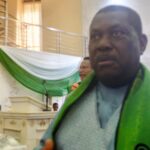From Maurice Okafor,Enugu.
The Federal Commissioner, National Population Commission (NPC) ,Enugu State, Hon. Ejike Ezeh, has stressed that accurate census in Nigeria is inevitable for national planning stating that at the current search for palliatives to cushion the effects of removal of fuel subsidy,an accurate census should be the guide for President Ahmed Bola Tinubu administration.
Hon Ejike Ezeh dropped this hints during his recent breakfast meeting with Media Executives in Enugu state and expressed optimism that President Tinubu will provide a new date for the conduct of the 2023 National Population and Housing Census,which was postponed because of the 2023 general elections.
He stated,”Census information is very useful in tracking progress towards national and internationally agreed development goals. Planners need population information for all kinds of development to work,including assessing demographic trends,analysing socio economic trends,analysing socio economic conditions,designing evidence based poverty reduction strategies and monitoring and evaluating the effectiveness of policies”
“For instance,a reliable census data will immeasurably assist our dear President Ahmed Bola Tinubu,in solving the socio economic problems arising from the removal of fuel subsidy. The government is talking about palliatives to cushion the effects of the removal of fuel subsidy on the people. A credible census data will guide the federal government in planning of the palliative measures”,he stated.
According to him, the Commission welcomed the decision of the last administration to postpone the conduct of the census in order to give the new administration the opportunity to make inputs into the process.
He noted that the postponement afforded the commission the opportunity to further perfect its processes and systems for the conduct of the first ever digital National Population and Housing Census in Nigeria.
He said,“As you are aware, the Commission has carried out all the preparatory activities towards the census such as the Enumeration Area Demarcation (EAD), conduct of pre tests and trial census, recruitment and training of census field staff, procurement and configuration of Personal Digital Assistants (PDAs), establishment of ICT infrastructure across the country and logistics support and advocacy and publicity activities.
“Conscious of the enormous human and material resources that have been expended in the implementation of these preparatory activities, the most important task before the commission is to sustain and reinforce the relevance of these activities to the successful conduct of the 2023 Census.
“This will ensure that the nation does not have to start afresh, the conduct of the census thereby saving costs.
“The processes and systems put in place for the census are therefore being currently reviewed to determine what needs to be done to ensure that the preparations do not become obsolete for the census. .
He stated further, “the focus of the commission is to ensure that all the resources expended so far are safeguarded and that the nation does not need to start all over when the census is going to be conducted.
“For us at NPC, this is not a difficult task. In coming up with the plan for the 2023 Census, we were not only looking at the immediate needs of delivering the next census, but concerned more with laying a solid foundation for future censuses.
“This mindset informed the scope and quality of arrangements put in place. For example, the EAD, which involved the division of the country into small land areas, was meticulously undertaken in such a way that only an update will be required for future censuses.
“Using satellite imageries, the Enumeration Areas (EAs) were all geo referenced with the coordinates of all the buildings established. The products of the EAD are currently being used by other government agencies.”
Speaking further, Eze recalled that the recruitment of the ad-hoc workers had been completed before the postponement through a rigorous online process in which about one million workers were screened and found worthy of assignment.
He said the data base of all the recruited personnel including their contact details is available for the next census, adding that the reserve personnel would be available to handle cases of attrition
“The Commission had commenced training of certain categories of personnel before the announcement of the postponement.
“These trainings include the facilitators at national, zonal and state levels, Data Quality Managers, Training Centre Managers, Monitoring and Evaluation Officers..
He added that ,” the next categories of personnel to be trained are the Supervisors and Enumerators. The Commission will continue to maintain contacts with the personnel through online trainings and mentorship.”
“Equally, the Commission had acquired Personal Digital Assistants for the 2023 Census. About 500,000 of these devices have been delivered to the 36 state offices and the FCT and configured for the exercise.
“Adequate arrangement is being made for the storage and security of the equipment to prevent damages and theft.”
He said in readiness for the census, the Commission had carried out massive advocacy and publicity for the 2023 National Population and Housing Census at national and state levels, intensified media campaigns and strengthened collaboration with stakeholders through the inauguration of Census Publicity Committees at national, state and LGA levels.
The federal Commissioner said publicity materials in English and local languages have been disseminated, while social media have been deployed on a massive scale.
He assured that the Commission will continue to carry out advocacy to ensure that the census messages remain at the centre of national discourse.
Stressing the importance of census data, he noted that Section 213 of the 1999 Constitution of Nigeria (as amended) made express provision for the conduct of the census and vested the powers to conduct census, civil registration and demographic surveys on the NPC.
Eze said the United Nations recommends that every country should hold population and housing census, at least, once every ten years.
He, however, regretted that the last census exercise in Nigeria was held 17 years ago, precisely in 2006 under the administration of the then President, Chief Olusegun Obasanjo.
He stated that until the latest efforts initiated by the immediate past administration, attempts by successive administrations to hold census proved unsuccessful.
He lamented that the non-conduct of census in Nigeria has hindered planning for socio-economic development in Nigeria.
“This anomaly is what the forthcoming National Population and Housing Census intends to correct.
“Census information is also very useful in tracking progress towards national and internationally agreed development goals.
,”Planners need population information for all kinds of development work, including assessing demographic trends, analyzing socio-economic trends, analyzing socio-economic conditions, designing evidence-based poverty-reduction strategies, and monitoring and evaluating the effectiveness of policies.”



